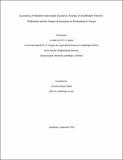Economics of Weather Index-based Insurance: Analysis of Smallholder Farmers' Preferences and the Impact of Insurance on Productivity in Kenya
Abstract/
Climatic risks are a major challenge for rural communities, especially those whose livelihoods directly depend on agriculture. Weather extremes affect crop productivity not only through the direct relationship between weather variables and yields, but also through the negative effects of such shocks on farmers’ investment behavior. In particular, smallholder farmers are vulnerable partly because they are predominantly located in the tropics where exposure to climate variability is high, but also because they lack the resources and the capacity to properly cope with risks. Agricultural insurance is one possible solution, but for long formal crop insurance remained unavailable in most developing countries. Institutional constraints, including high transaction costs, the spatially correlated nature of agricultural risks, and classical issues of information asymmetry, discouraged insurers from offering agricultural insurance contracts.
Recently there have been efforts to change this situation through the development and provision of weather index insurance (WII) contracts. A WII contract is advantageous because the insurer relies on an objectively measured weather variable that is correlated with farm losses but which cannot be manipulated through farmers’ actions. Usually indexes used in WII are measured at the aggregate level, minimizing issues of moral hazard and adverse selection into insurance programs. Moreover, the insurer is saved from having to assess losses on each insured farm, an aspect that cuts down administrative costs. In turn, if the WII contracts are well designed, insured farmers can benefit because of relatively affordable insurance …

